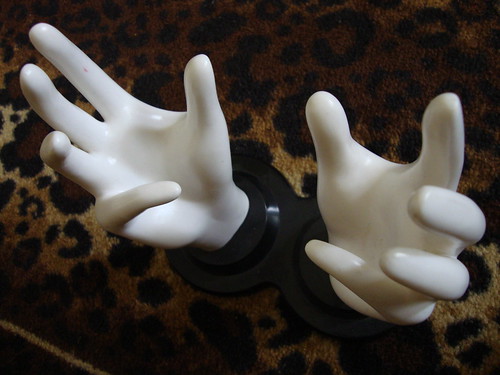There's always more than one way to view a situation. Take this photo. It could be saying any number of things to you, including:
Come to me, and I will give you rest.
I'm letting go.
Go in peace.
Kill the fatted calf.
I want what's rightfully mine.
I give up. I can't get through to you.
I'm going to wring your neck.
It was this big.
Hocus pocus.
Hubba-hubba.
Come give your Auntie a big, slobbery kiss, you darling boy.
I know you'll come up with some good ones.
(And when you do, share them in the comments section!)
It's a wonder we understand half the things people say and do when we have all these filters to warp the message.
That's why I think writers and professional communicators are vastly underappreciated. Ditto lyricists. The good ones manage to craft a message that slogs through the muck of our mindset at the moment. The excellent ones even make it look easy. The slimy ones churn out steer manure and call it a compliment.
Since the professional message-senders have such a tough time, there ought to be a reciprocal career for professional understanders. Not merely interpreters, but honest to goodness understanders. Maybe they're already employed, but their titles obscure what they do. Some are called shrinks or spiritual advisors. Or mothers, best friends, soulmates — the latter group unpaid but no less skilled at what they do.
Assigning meaning is a human ability. It's usually exercised in snap decisions, first impressions, and unfortunately, gossip-mongering. Discovering true meaning is a function of the intellect working in harmony with the soul, usually over time.
How to reverse the pollution of misinterpretation? I'd say we start by practicing two clichés that have undeservedly earned a bad rap.
The first is, "Give the other fellow the benefit of the doubt."
The second is, "There's always two sides to a coin."
I promise to pause before deciding to believe that So-and-So said Such-and-Such. I commit to considering what else the other person could have meant apart from how I took it to mean. I will make the effort to run my strong opinions through the sieve of "Is it true? Is it kind? Is it necessary?" to choose how and which ones I do express.
And if I forget, leap to conclusions, take instant offense or swallow a flatterer's line, I promise to view a poorly dubbed martial arts movie. The mouths not matching the words will serve to remind me that the pollution of misinterpretation will persist unless I do something about it in my own small way.

